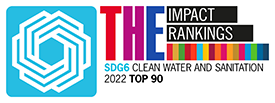Dalhousie University continues to take its place among the top 200 universities in the world contributing to a better global future.
This is the second year Dalhousie has ranked 101-200 in the , despite growth in the number of universities taking part — this year’s rankings include 1,406 universities from 106 countries. Dal’s overall score of 84.8, out of a possible 100, is an increase of 3.3 points over last year’s score.
 The Impact Rankings, released on April 27 this year, measure the success of universities in delivering on the . Universities can submit data on as many of the 17 SDGs as they choose and any university that provides data on SDG 17: Partnerships for the Goals and at least three other SDGs is included in the overall ranking.
The Impact Rankings, released on April 27 this year, measure the success of universities in delivering on the . Universities can submit data on as many of the 17 SDGs as they choose and any university that provides data on SDG 17: Partnerships for the Goals and at least three other SDGs is included in the overall ranking.
Dalhousie received top 200 placements in each of the six SDG-related categories it competed in this year. The university’s work related to both SDG 3: Good Health and Well-being and SDG 14: Life Below Water earned top 50 rankings, and Dal placed among the top 100 for SDG 6: Clean Water and Sanitation.
Dal researchers are contributing to global goals
Now in their fourth year, the Impact Rankings assess universities across four broad areas: stewardship of the university’s significant resources, university outreach in support of the SDGs, teaching sustainability for future generations, and research in topics related to the SDGs.
Scholarly output plays a key role in supporting societal change and it’s one of the main ways universities support the SDGs. Dalhousie University has aligned its research with the SDGs for several years — the five signature research clusters and two cross-cutting themes outlined in the university’s Strategic Direction for Research and Innovation are grounded in the SDGs. Last year, 70 per cent of university researcher funding applications identified an SDG as relevant to the research.
“The United Nations’ Sustainable Development Goals provide a roadmap for our research community to ensure we are on track to make the world a better place while ensuring no one is left behind,” says Dr. Alice Aiken, Dalhousie’s vice-president, research and innovation. “It’s reassuring to know that our efforts to improve health and education, spur economic growth, tackle climate change and preserve our oceans and forests are well recognized among our global peers.”
Ensuring healthy lives
 Dalhousie’s efforts to improve health and well-being in its communities and around the world are getting noticed. The university was ranked 34 (of 1101) globally and fourth nationally for its contribution to SDG 3: Good Health and Well-being. Dal's overall score of 86 is based on a combination of submitted information about Dal’s health-related collaborations and a measurement of the university’s research related to the goal of ensuring healthy lives across the globe.
Dalhousie’s efforts to improve health and well-being in its communities and around the world are getting noticed. The university was ranked 34 (of 1101) globally and fourth nationally for its contribution to SDG 3: Good Health and Well-being. Dal's overall score of 86 is based on a combination of submitted information about Dal’s health-related collaborations and a measurement of the university’s research related to the goal of ensuring healthy lives across the globe.
Further reading: Investigating Impact: Student‐run HOPES Clinic seeks better health care for society’s most vulnerable
When assessing research impact for this ranking, Times Higher Education looked at output related to the key conditions and diseases that have a disproportionate impact on health outcomes across the world. Dalhousie’s score for research in this area, which was determined using data on paper views, clinical citations and the volume of research produced, was more than twice the worldwide median.
Careful management of a global resource
 Dalhousie also ranked among the top 50 in the world for delivering on SDG 14: Life Below Water. Reflecting its leadership in ocean teaching and research, the university was ranked 49 (of 452) globally and 10th in Canada. The overall score of 79.1 is an increase from last year and measures Dal’s ongoing action in support of aquatic ecosystems and incredible research breadth in this area.
Dalhousie also ranked among the top 50 in the world for delivering on SDG 14: Life Below Water. Reflecting its leadership in ocean teaching and research, the university was ranked 49 (of 452) globally and 10th in Canada. The overall score of 79.1 is an increase from last year and measures Dal’s ongoing action in support of aquatic ecosystems and incredible research breadth in this area.
Further reading: Investigating Impact: Working together for ocean sustainability
Clean water, clean energy and responsible consumption
 Dal's contribution toward achieving SDG 6: Clean Water and Sanitation earned a rank of 84 (of 634) in the world and 12th in Canada. The university's rank in this category was calculated based on a combination of institutional water stewardship, community outreach and related research strength.
Dal's contribution toward achieving SDG 6: Clean Water and Sanitation earned a rank of 84 (of 634) in the world and 12th in Canada. The university's rank in this category was calculated based on a combination of institutional water stewardship, community outreach and related research strength.
Further reading: Investigating Impact: Freshwater research supports water security in Canada’s Arctic communities
The university ranked in the top 200 for SDG 7: Affordable and Clean Energy and for SDG 12: Responsible Consumption and Production.
Further reading: Investigating Impact: Innovative energy efficiency practices on campus lead the way for the wider community
Further reading: Investigating Impact: How Dal is doing its part to reduce the world’s material footprint
Working together to share knowledge and expertise
 SDG 17: Partnership for the Goals is the only compulsory SDG for inclusion in the overall rankings. The measurement for this category explores the broader ways in which universities support the SDGs through collaboration with other countries, promotion of best practices and publication of data. The research portion of the score specifically looks at the proportion of academic publications with a co-author from a low- or lower middle-income country, and the overall number of publications that relate to the 17 SDGs.
SDG 17: Partnership for the Goals is the only compulsory SDG for inclusion in the overall rankings. The measurement for this category explores the broader ways in which universities support the SDGs through collaboration with other countries, promotion of best practices and publication of data. The research portion of the score specifically looks at the proportion of academic publications with a co-author from a low- or lower middle-income country, and the overall number of publications that relate to the 17 SDGs.
This year, Dalhousie improved its score for SDG 17 by 25.3 points over last year, bringing it to 90.8. This resulted in a top 100 (of 1,438) global ranking in Partnership for the Goals.
It's an upward trend that’s on track to continue as the university's research publications, citation counts and international research collaboration continue to grow each year — and as Dalhousie continues its important work toward fulfilling the UN SDGs by 2030.

